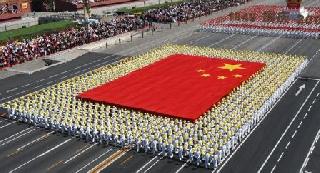
BEIJING (PTI): China on Saturday announced that it will increase its defence spending by around seven per cent this year, the slowest hike since 2010, even as it vowed to guard against "outside forces" interfering in its territorial disputes.
The increase in defence spending announced by Fu Ying, the spokesperson of China's parliament, the National People's Congress (NPC), is expected to take the country's defence budget to about 1.02 trillion yuan, which is three times bigger than India's new defence budget of US$ 53.5 billion.
The nearly seven per cent increase could be China's slowest defence budget rise in at least a decade, marking the second time for the defence budget increase to dip into the single digit since 2010, state-run Xinhua news agency reported.
Last year, China increased its defence spending by 7.6 per cent, allocating about 954 billion yuan (around US$ 143.7 billion).
A year before that, China increased the defence spending by about 15 per cent as part of its efforts to modernise the world's largest military of 2.3 million troops.
China's announcement to increase defence spending comes after US President Donald Trump vowed a 10 per cent increase in America's military spending of about US$ 600 billion.
Much of China's budget this year was expected to go for the development of Navy as the second largest economy looks to expand its influence beyond its shores.
China's claims in the South China Sea and East China Sea have caused a lot of concern in the region.
China currently has one aircraft carrier and is building another. Chinese defence officials say that the third is also in the pipeline to match the growing strength of US Navy in hotspots like the disputed South China Sea.
"China's military capacity building will be continued.
This is the requirement for safeguarding our national sovereignty and security," Fu told media.
She said China's defence budget accounted for 1.3 per cent of the country's GDP, compared with NATO members' pledge to dedicate at least two per cent of GDP to defence.
"You should ask them what their intentions are," Fu told reporters, adding that China has "never inflicted harm on other countries."
"Of all the conflicts and wars in the world that have killed and displaced so many people and caused significant losses of property, which one is China to blame for?" she asked.
On China's disputes with neighbouring countries, Fu said China advocates dialogue and peaceful solutions in addressing those issues.
"We call for a peaceful settlement through dialogue and consultation (of the disputes). But at the same time, we must also have the capability to defend our sovereignty, our rights and interests," Fu said.
"In particular, we must guard against outside forces from interfering with such issues," Fu said.
The NPC spokesperson, however, did not elaborate on what "interfering" she was referring to and also did not mention the disputes in question.
"The enhancement of China's capabilities is conducive to safeguarding regional peace and stability, not the contrary," she said.
On the South China Sea issue where US has deployed an aircraft carrier to assert its freedom of navigation, she said China and some ASEAN (Association of Southeast Asian Nations) countries have already returned to dialogue and consultation, and tensions in the area have shown trends of easing.
"As to the future development (of the settlement of these disputes), I think we also need to take into account the intentions on the US side," she said, calling the US' actions in the SCS a "weather-vane" for the region.
Fu went on to say that concerns over navigational freedom in the SCS are misleading and uncalled for.
"In essence...Washington is perhaps concerned that China could catch up with or surpass the US in terms of capability," she said, noting that there is still a huge gap between the two countries.
Fu said whether a military poses a threat rests on its "strategic intentions."
"Thus the key question we should really ask is whether we are pursuing common security or exclusive security," Fu said.
"China wants common security for all, and this is the shared consensus of many Asian countries as well," she said.
China's economic growth continued to slowdown as last year it registered a nearly three-decade low of 6.7 per cent declining from 6.9 in 2015.
The increase in China's military expenditure, especially for the Navy, is aimed at safeguarding the country's fast expanding overseas interests and is in response to the unstable security situation in the Asia-Pacific region, Chinese military experts were quoted as saying by the state-run Global Times last week.
Chu Yin, associate professor at the University of International Relations, said, China's rapid military development is a recurrent trend with the country's rising economic power, and is entirely legitimate and reasonable.
"It doesn't need Trump as an excuse," he told the daily.
 Previous Article
Previous Article












The Indian Air Force, in its flight trials evaluation report submitted before the Defence Ministry l..
view articleAn insight into the Medium Multi-Role Combat Aircraft competition...
view articleSky enthusiasts can now spot the International Space Station (ISS) commanded by Indian-American astr..
view article